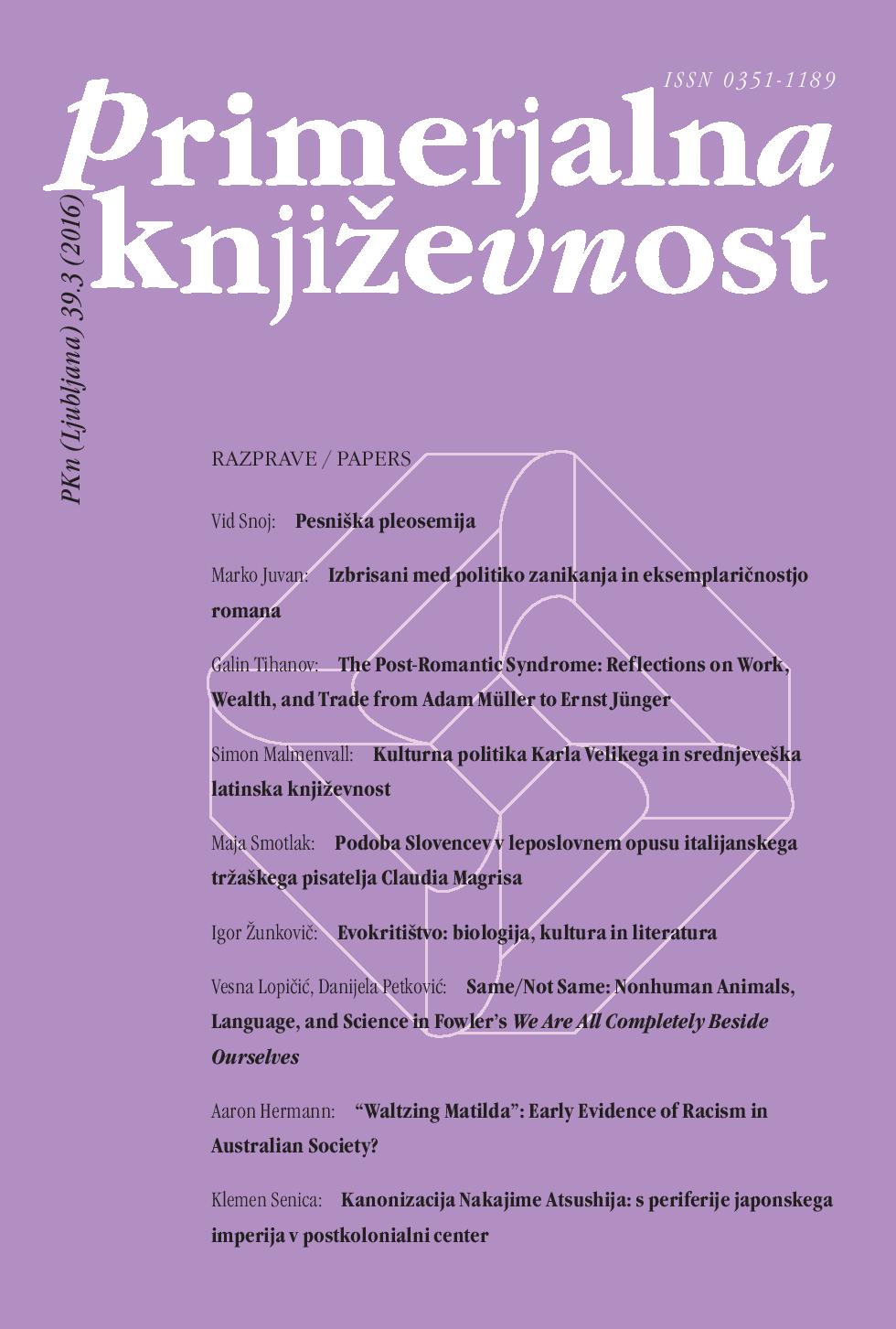The Post-Romantic Syndrome: Reflections on Work, Wealth, and Trade from Adam Müller to Ernst Jünger
Keywords:
history of discoursive formations, Romanticism, post-Romanticism, political economy, social philosophy, community and society, German cultural space, Müller, Adam, Sombart, Werner, Jünger, ErnstAbstract
The article presents an original, innovative and interdisciplinary contribution to intellectual history. It examines the intersections between economic and political thought, social philosophy, and aesthetics and literature that inform a pervasive postromantic discourse on work, wealth and capital spanning the nineteenth century and becoming particularly prominent in the first third of the twentieth century in Germany and Austria.References
Bauman, Zygmunt. Modernity and the Holocaust. Cambridge: Polity Press, 1989.
Baxa, Jakob. Adam Müllers Philosophie, Ästhetik und Staatswissenschaft: eine Gedächtnisschrift zu seinem 100. Todestage. Berlin: Junker & Dünnhaupt, 1929.
Bohrer, Karl Heinz. Die Kritik der Romantik. Der Verdacht der Philosophie gegen die literarische Moderne. Frankfurt am Main: Suhrkamp, 1989.
Gray, Richard T. “Economic Romanticism: Monetary Nationalism in Johann Gottlieb Fichte and Adam Müller.” Eighteenth-Century Studies 36.4 (2003): 535–557.
– – –. Money Matters: Economics and the German Cultural Imagination, 1770–1850. Seattle: University of Washington Press, 2008.
Grundmann, Reiner, and Nico Stehr. “Why Is Werner Sombart Not Part of the Core of Classical Sociology?” Journal of Classical Sociology 1.2 (2001): 257–287.
Habermas, Jürgen. “Modernity – an Incomplete Project.” Postmodern Culture. Ed. Hal Foster. London: Pluto, 1985. 3-15.
Jünger, Ersnt. Der Arbeiter. Sämtliche Werke. Vol. 8. Stuttgart: Klett-Cotta, 1981.
Kracauer, Siegfried. “Gestaltschau oder Politik?“ Schriften. Vol. 5.3. Frankfurt am Main: Suhrkamp, 1990. 118–123.
Lange, B., and A. N. Dmitriev. “Rabochee ob”edinenie po izucheniiu sovetskogo planovogo khoziaistva (Arplan).” Sovetsko-germanskie nauchnye sviazi vremeni Veimarskoi respubliki. Ed. E. I. Kolchinskii. St Petersburg: Nauka, 2001. 197–206.
Löwy, Michael, and Robert Sayre. Romanticism Against the Tide of Modernity. Trans. Catherine Porter. Durham, NC and London: Duke UP, 2001.
Marx, Karl. Grundrisse. Foundations of the Critique of Political Economy. Trans. Martin Nicolaus. London: Penguin, 1973.
Müller, Adam. Nationalökonomische Schriften. Ed. Albert Josef Klein. Lörrach: Albert Kern, 1983.
Nikë, Mishel’. “Revoliutsionnyi romantizm.” Sotsrealisticheskii kanon. Ed. Hans Günther and Evgenii Dobrenko. St. Petersburg: Akademicheskii proekt, 2000. 472–480.
Praz, Mario. The Romantic Agony. Trans. Angus Davidson. London: Oxford University Press, 1933.
Rubinstein, Sigmund. Romantischer Sozialismus: Ein Versuch über die Idee der deutschen Revolution. Munich: Drei Masken Verlag, 1921.
Salin, Edgar. Geschichte der Volkswirtschaftslehre. Berlin: Springer, 1923.
Schmitt, Carl. Political Romanticism. Trans. Guy Oakes. Cambridge, MA: MIT Press, 1986.
Sombart, Werner. Economic Life in the Modern Age. Ed. Nico Stehr and Reiner Grundmann. New Brunswick: Transaction Publishers, 2001.
– – –. The Jews and Modern Capitalism. Trans. M. Epstein. London: Unwin, 1913.
– – –. Krieg und Kapitalismus. Munich: Duncker & Humblot, 1913.
Spann, Othmar. Types of Economic Theory. Trans. Eden and Cedar Paul. London: Allen and Unwin, 1930.
Stehr, Nico, and Reiner Grundmann. “Introduction.” Werner Sombart, Economic Life in the Modern Age. New Brunswick: Transaction Publishers, 2001. ix–lxii.
Tihanov, Galin. “Community and Society: Brief Notes on Ferdinand Tönnies and German Romanticism.” Parachoveshkoto: gratsiia i gravitatsiia. Ed. M. Kalinova, K. Spasova and D. Tenev. Sofia: Sofia UP (forthcoming).
Tönnies, Ferdinand. “Mein Verhältnis zur Soziologie.” Soziologie von heute. Ein Symposion der Zeitschrift für Völkerpsychologie und Soziologie. Ed. Richard Thurnwald. Leipzig: C. L. Hirschfeld, 1932. 103–122.
– – –. Community and Society. New York: Dover, 2002.


